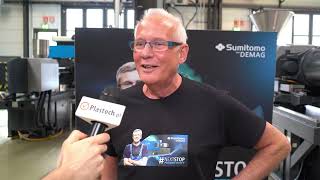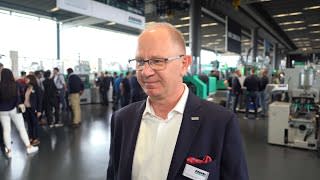Thermoplastic fabric has long been available, but thermoplastic tapes reinforced with glass fibre or carbon fibre are gaining importance. Usually tapes are only 0.14 to 0.3 mm thick, which is suitable for very few applications. As a result, layups consisting of up to 20 tape layers are produced and their design is part of the component structure. ENGEL has designed its own layup cell for tape layups, i.e. building layups directly upstream of the injection-moulding process. Based on the pick-and-place principle, it works in sync with the injection-moulding process. ENGEL also uses the technology in its own production. The robots of the e-pic series have a lightweight carbon arm which is produced at the ENGEL robot factory in Dietach, Austria using this new process. By using this innovative manufacturing technology, it was possible to reduce the weight of the robot rotational axis by 37 per cent. This gives the robot significantly higher dynamics and raises energy efficiency.
Reactive processing combined with injection moulding
ENGEL is also one of the pioneers in the field of reactive processing where the aim is to increase the use of thermoplastic matrix materials. In 2012, ENGEL presented its first integrated concept for the in-situ polymerisation of ε-Caprolactam into polyamide directly in the mould in which a dry fibre preform is placed. ENGEL presented a near-production manufacturing cell at K 2016, and recently at the international automotive conference trend.scaut which took place in Austria in June of this year. The cell combines in-situ polymerisation (T RTM) with the downstream functionalisation of the FRP support structure in the injection moulding process. “The automotive industry has shown great interest in this highly-integrated thermoplastic-based process,” reports Egger. “We are now prepared to collaborate with the industry to start component development.”The integrated, highly automated system concept is based on a v-duo press which ENGEL developed specifically for fibre-reinforced composition applications as well as multi-component processes with fibre preforms. The v-duo is a comparatively compact, energy-efficient machine that enables extremely cost-efficient manufacturing solutions. Its vertical clamping unit is accessible from all four sides instead of just two which simplifies automation.
Since it was launched in 2012, the v-duo series has been very successful in the automotive industry. For example, BMW uses a v-duo 3600 at its Landshut factory to produce large structural components from fibre-reinforced plastics using the HP-RTM process. The ENGEL machine has a clamping force of 36,000 kN. A v-duo 2300 is installed at Audi for the production of B-pillars. A v-duo 3600 was also supplied to the Open Hybrid LabFactory in Wolfsburg, Germany, to research functionally integrated composite technologies.




